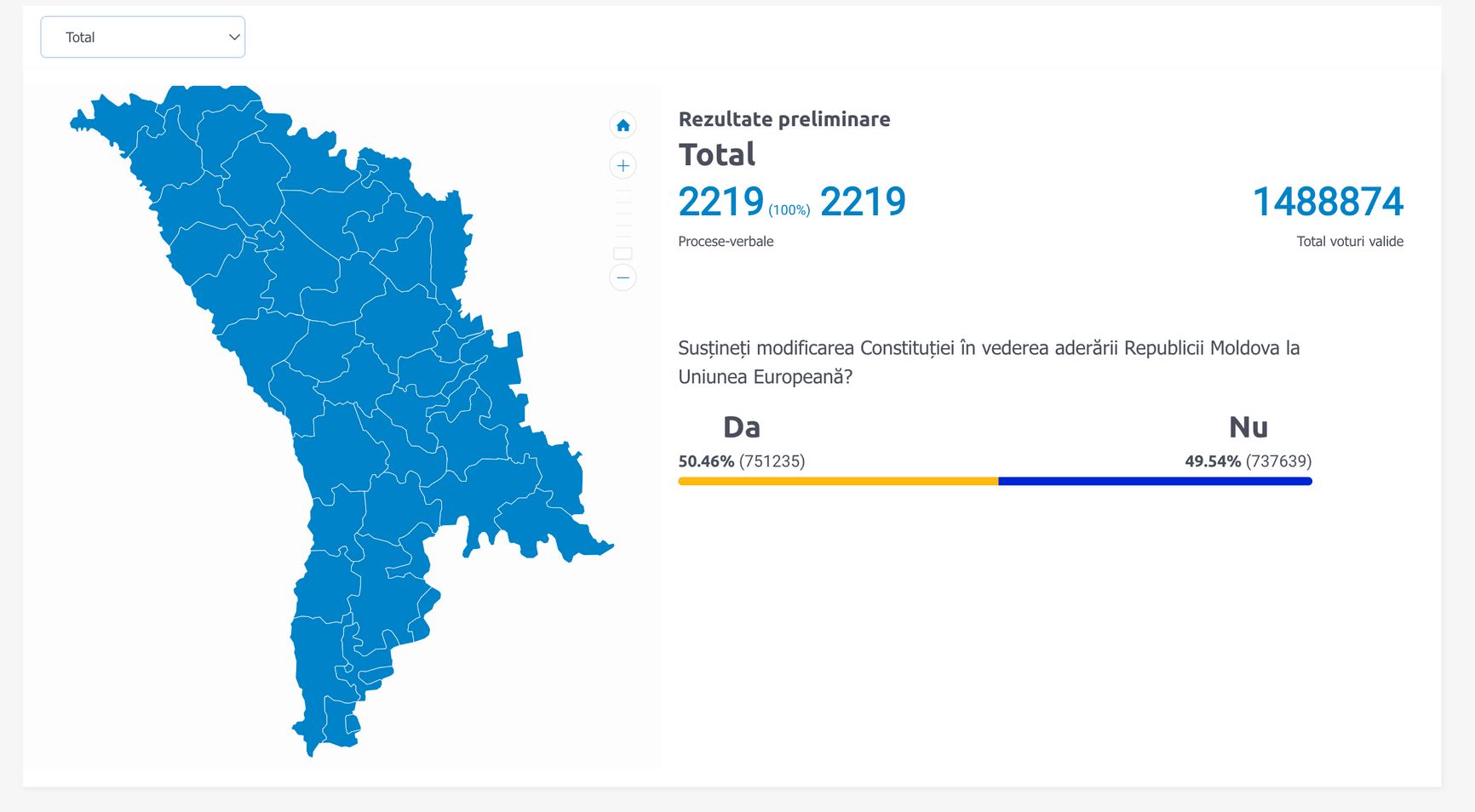
Cover photo: Vadim Ghirda / AP
Moldova has narrowly approved EU accession with a 50.4% majority in a referendum that was overshadowed by allegations of Russian-backed interference.
Preliminary results on Monday suggested the referendum on Moldova's EU membership was headed for a “no” — but a late surge in pro-EU votes from the country's diaspora appear to have tipped the balance, securing a narrow victory for incumbent President Maia Sandu, who is attempting to steer the former Soviet republic on a pro-Western course.
“We fought fairly in an unfair fight — and we won,” the 52-year old leader wrote on X.
The tight result surprised Sandu's supporters, who had hoped the vote would send a clear signal of Moldova's intention to join the European Union by 2030 — and to break away from Moscow's influence once and for all. Official figures indicated that the winning margin was just under 14,000 votes.

Screenshot of Moldova's EU referendum results. The sole question on the ballot read: “Do you support the amendment of the Constitution with a view to the accession of the Republic of Moldova to the European Union?”
Source: Moldova's Central Election Commission
With 100% of the ballots finally counted, Moldova’s Central Election Commission reported that 50.46% of voters had decided in favor of an amendment establishing EU membership as a political goal, with 49.54% voting against it. Turnout on Sunday exceeded 50% — far above the 33% required for the referendum to be valid.
A clause will now be added to Moldova’s constitution formalizing the country’s aspirations of joining the EU. The country began the lengthy process of formal accession negotiations in June.
The referendum took place on the same day as presidential elections. 42% of voters backed the incumbent president, while 26% voted for her chief rival, former Prosecutor General Alexandr Stoianoglo of the pro-Russian Socialist Party (PSRM).
Since no candidate secured 50% of the vote, a second round of balloting will take place on Nov. 3.
Stoianoglo has promised to pursue a “balanced” foreign policy with ties to the EU, the United States, Russia, and China if elected. He boycotted Sunday's referendum, calling it a ploy to bolster Sandu's re-election campaign and challenged her to a televised debate ahead of the runoff.
Previously, President Sandu told Moldovans that there was “clear evidence” criminal groups, in collaboration with «foreign forces hostile to our national interests,” had attempted to buy 300,000 votes in an attempt to “undermine a democratic process.”
“Criminal groups, working with foreign forces hostile to our national interests, have attacked our country with tens of millions of euros, lies, and propaganda, using the most disgraceful means to keep our nation trapped in uncertainty and instability,” Sandu wrote on X.
In early October, Moldovan law enforcement officials said they had uncovered a large-scale vote-buying operation run by Ilan Shor, a fugitive Moldovan oligarch currently residing in Russia. The scheme involved €15 million paid to 130,000 individuals — close to 10% of the active electorate — to influence the two upcoming ballots. Some of the money was brought into Moldova from Moscow by cash mules, authorities suspect.
The Insider reported on Ilan Shor and his connections with Russia in an April 2024 piece.
Shor, who was convicted in absentia last year and sentenced to 15 years in prison for fraud and money laundering related to the disappearance of nearly €1 billion from Moldovan banks in 2014, denied the charges, claiming in a post on Telegram that “all payments are legal.” His pro-Russian populist Shor Party was declared unconstitutional and banned last year. Shor is also under Western sanctions, accused of “malign influence campaigns” carried out on behalf of Russia.
The pro-European Sandu was elected president in 2020. The following year, Moldovans chose a parliament dominated by pro-Western forces. The country is set to hold fresh parliamentary elections next year.
Moldova and its population of around 2.5 million applied for EU membership after Russia’s full-scale invasion of neighboring Ukraine in early 2022. The country was granted candidate status that summer — alongside Kyiv.
Moldova's twin votes took place ahead of a closely contested parliamentary election next Sunday in Georgia — another former Soviet republic seeking EU membership despite attempts by Moscow to impede its Westward path.